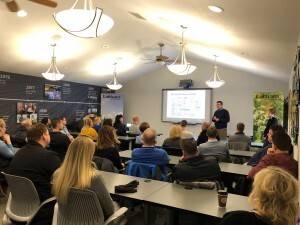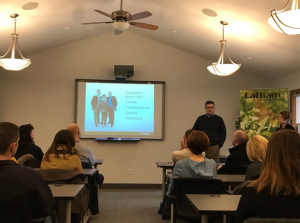So how do we cultivate a culture of leadership? Our state is fortunate to have Leadership Iowa, which began in 1982 “to instill passion in our current and emerging leaders while fostering a high level of civic engagement.” A fundamental founding principle of Leadership Iowa was to educate and motivate new leaders from all sectors: business, education, farming, labor, nonprofits and government.
These leaders have different careers, different interests and different points of view, providing a valuable learning environment for all participants. They come to realize that public and private sectors share common interests, and they see how their teamwork can help benefit Iowa and its communities.

Leadership Iowa participants travel around the state, focusing on economic development, health care, education, government services, environment, recreation and other issues. This month they are focusing on agriculture, and Latham Hi‑Tech Seeds had the pleasure of hosting the group’s first stop. We shared our story of how we’re proud to carry on the family tradition of producing the highest quality seeds for farmers to plant throughout the Upper Midwest.
“I had no idea where farmers got the seeds they plant and was impressed by how much science and research go into modern agriculture. It’s fascinating,” said Leadership Iowa participant Maureen “Mo” Lockwood, manufacturing manager for Thombert, Inc. in Newton.
John and Shannon Latham explained how farmers don’t plant the seeds they harvest. A lot of science goes into the development of seed, and as a result, yields have dramatically increased. (Click here if you’re interested in learning more about why farmers don’t save their seed.)
“Much of what we discussed about ag is all new to me. I didn’t know much about GMOs. I also had no idea how many complicated decisions farmers have to make. When you drive by a soybean field, you don’t think about details like where the seed comes from, how the land is managed or where the crop goes after it’s harvested. I learned a lot here in Franklin County,” said Sandy Byers, director of surgical services at CHI Health Mercy in Council Bluffs.

At Latham Seeds, we contract with farmers to grow seed stock. Most of our soybeans, for example, are grown within 30 miles of our plant in Alexander, Iowa. Upon harvest, that seed is delivered to Alexander. We then check each wagon load or semi load by hand. Each variety that meets our initial inspection is stored in separate grain bins until we’re ready to clean, condition and bag it. The quality of the seed is checked every step of the way.
“I was impressed by how high tech today’s corn and soybean seeds are. I also learned a lot about what cover crops are and why farmers plant them. I liked the opportunity to visit with farmers and ask them questions,” said Leadership Iowa participant William Sonderman, manager of transmission planning and tariffs, Central Iowa Power Cooperative, Cedar Rapids.
One question asked by participants was related to succession planning. Succession planning helps ensure the family business or family farm will continue to operate by identifying future leaders and managers. We also talked about the importance of work experience and succession planning.
“I noticed how many speakers talked about the importance of working for someone else before returning to the family business. This is something that’s important to my family for our business, too,” said Michelle Cassabaum, COO/CFO, 21st Century Rehab in Nevada.

From Alexander, Leadership Iowa participants traveled to Mayne’s Grove near Geneva where they met with young Franklin County farmers about how they got started farming. They also learned about drones and precision technology that can help farmers use variable rate planting to match plant population to field conditions, as well as manage micronutrients through foliar feeding and nitrogen through timing and placement.
“Some of the things I take for granted as common knowledge about ag aren’t common knowledge for our non-farm friends. This struck me during our Leadership Iowa ag sessions in Franklin County, and I’m reminded why sharing ag’s story is so vital. Some of my Leadership Iowa classmates weren’t raised in rural Iowa but grew up in New Mexico or Massachusetts. Others are Midwesterners but grew up in large cities like Minneapolis. Even native Iowans in my class have little or no contact with modern agriculture. They have a lot of interest in learning about ag, though, and ask a lot of thoughtful, honest questions about what defines a factory farm versus a family farm, what’s being done to address water quality, why do farmers plant cover crops, and more. Who better to help answer these questions than farmers and other ag professionals?” Darcy Maulsby, fifth generation farmer and author-preneur from Lake City.
Yesterday afternoon the Leadership Iowa group also toured the Whispering Willow Wind Farm south of Hampton before ending their day with a meal on the farm of Charlie and Barb Brown of Hampton. Sitting down to share a meal allows people to reflect upon the day, share stories and reflect upon experiences.
“Even though our business serves agriculture, I don’t come in contact with all the different aspects of crop and livestock production. Now when people talk about various ag terms and farming methods, I have a much better idea of what this all means and how things work.” –Molly Varangkouhn, president, Hy-Capacity, Humboldt
We hope the Leadership Iowa group departs Franklin County with fond memories! Good food also helps make good memories, so today we’re sharing with you a favorite recipe from Claire Masker, who was a member of Leadership Iowa 2015-16 and also is director of public relations for the National Pork Board. Find other recipes, like Pulled Pork Tortilla Soup, at Pork.org.
Taco Soup
Ingredients
Ingredients:
- One, 4.6-ounce can black olives, drained and sliced (optional)
Directions
Directions:
Brown ground pork and onions in a large skillet; drain excess fat and then transfer into a large slow cooker or stockpot. Add beans, corn, tomatoes, green chiles, olives, taco seasoning, and ranch dressing mix; cook in a slow cooker on low for 6 to 8 hours or simmer over low heat for about 1 hour on the stove. To serve, place corn chips in each bowl and ladle soup over them. Top with sour cream, cheese, green onions and jalapenos.
